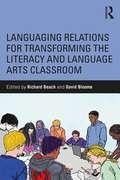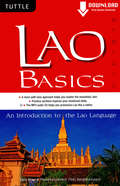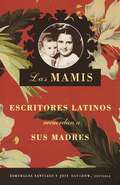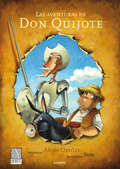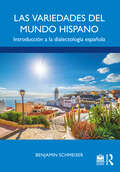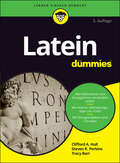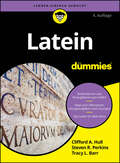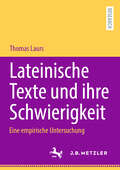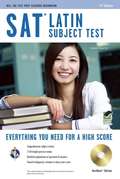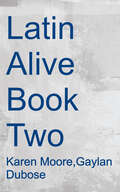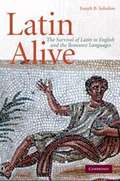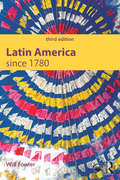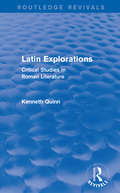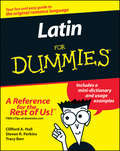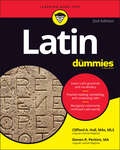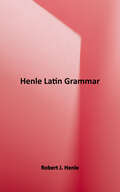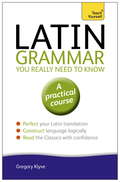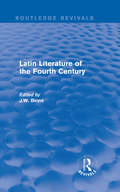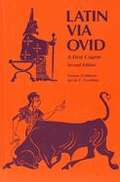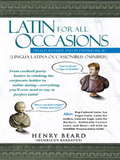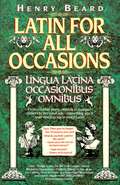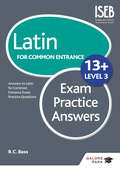- Table View
- List View
Languaging Relations for Transforming the Literacy and Language Arts Classroom
by Richard Beach David BloomeApplying a languaging perspective, this volume frames the teaching and learning of literacy, literature, language, and the language arts as social and linguistic actions that generate new questions to make visible social, cultural, psychological, linguistic, and educational processes. Chapter authors explore diverse aspects of a languaging framework, the perspective of language as a series of ongoing and evolving interactional social actions and processes over time. Based on their research, the authors suggest directions for addressing substantive engagement as well as the marginalization, superficiality, and violence (symbolic and otherwise) that characterize the educational experience of so many students. Responding to the need to foster and support students’ intellectual, social, and affective worlds, this book showcases how languaging relations among teachers and students can deepen interactions and engagement with texts; enhance understandings of agency, personhood, and power relations in order to transform literacy, literature, and language arts classrooms; and improve the lives of teachers and students in educational settings.
Lao Basics: An Introduction to the Lao Language
by Sam Brier Phouphanomlack Tee SangkhamponeThis is a concise, do-it- yourself guide to the Lao languageLao Basics teaches conversational Lao from the very beginning with an emphasis on reading and writing. <P><P>Students of Thai will find Lao quite simple, as much of these two languages are the same or very similar. These languages derive from Sanskrit and share many of the same consonants, vowels, vocabulary and grammar. Lao Basics is organized so that you first learn to read Lao, write Lao, speak Lao and comprehend the 26 consonants in their tonal classes. Once you have mastered these you will study the 28 vowels in subsets. Within each vowel grouping, you will learn vocabulary, conversational phrases, alphabetical order and sentence structure through exercises that grow more challenging as your vocabulary increases.As you progress through Lao Basics, vocabulary from previous lessons will be repeated regularly and our command of the written and spoken language will steadily improve. And you can do all this on your own. Each chapter's Lao words and exercises have been recorded on the accompanying MP3 audio-CD, and all of the exercises answers are in the back of the book.Highlights of this book are: Throughout, review exercises with answer keys help you polish your skills. The vocabulary and phrases are written in Lao script, and are accompanied by pronunciations that help English speakers to say them accurately. The MP3 audio CD includes every vocabulary item, sample phrases, and exercises, so that you can learn from native voices.
Las Mamis
by Esmeralda Santiago Joie Davidow Nina Torres-VidalUna maravillosa antología nueva--las escritoras y los escritores latinos más admirados comparten recuerdos de sus madres. Las mujeres amorosamente retratadas en lasLas Mamisrepresentan la diversidad de la vida y cultura latinas. Provienen de las familias ricas de las grandes ciudades de Latinoamérica, de familias campesinas emigrantes y también de la variedad de mundos intermedios. Además, comparten todas una extraordinaria fuerza interior, frecuentemente retada por la adversidad. Presionadas por circunstancias y expectativas culturales conflictivas, lograron enfrentar los retos de la maternidad y dejar para sus hijos e hijas un legado perdurable. Y ahora, en estos vívidos, conmovedores y, en ocasiones, divertidísimos recuerdos, todos imbuidos de un claro sabor latino,Las Mamiscelebra la universalidad del amor de familia y el vínculo especial entre madres e hijos. Colaboradores: Marjorie Agosín Alba Ambert Liz Balmaseda Mandalit del Barco Gioconda Belli Junot Díaz María Amparo Escandón Dagoberto Gilb Francisco Goldman Jaime Manrique Gustavo Pérez-Firmat Esmeralda Santiago Ilán Stavans Piri Thomas
Las aventuras de Don Quijote
by Subi Anna ObiolsUna cuidada adaptación para introducir a los más pequeños en la obra de Cervantes Don Quijote de la Mancha Hace muchísimos años, un escritor, Miguel de Cervantes, se inventó una novela, para muchos la mejor de todos los tiempos. Un loco de atar, tierno y entrañable, estaba dispuesto a poner paz en el mundo; para ello contaría con dos ayudas inestimables: su amada Dulcinea y su fiel escudero, Sancho Panza. Con Las aventuras de Don Quijote hemos pretendido acercar a los más pequeños de la casa la genial novela de Cervantes, para que descubran, por primera vez, la ternura y humanidad que se esconde detrás del irrepetible e ingenioso hidalgo Don Quijote de la Mancha.
Las variedades del mundo hispano: Introducción a la dialectología española
by Benjamin SchmeiserLas variedades del mundo hispano tiene un acercamiento nuevo a la dialectología española, ya que guía a los estudiantes por las macrovariedades fascinantes y diversas del mundo hispano. Un libro de texto único escrito en español que ofrece una introducción atractiva y accesible a la dialectología española, sus ámbitos claves incluyen: la cobertura de España, Sudamérica, Centroamérica, y Norteamérica; el libro de texto contiene una mezcla ideal de teoría y práctica; secciones de Práctica que contienen ejercicios para reforzar el aprendizaje; e incluye actividades que invitan a los estudiantes a explorar materiales de video y audio en el sitio web que acompaña el libro de texto. Además, el libro de texto incluye un componente de redes sociales que deja que los estudiantes aprendan en un formato que ha sido poco utilizado en cursos universitarios. Aunque principalmente fue diseñado para estudiantes de dialectología y fonética, tanto a nivel subgraduado como graduado, también sería una fuente invaluable para otros cursos de la lingüística hispánica al nivel universitario. Las variedades del mundo hispano takes a refreshing approach to Spanish dialectology, guiding students through the fascinating and diverse macro varieties of the Spanish-speaking world. A unique textbook written in Spanish and offering an engaging and accessible introduction to Spanish dialectology, its key features include: coverage of Spain, South, Central and North America; the ideal balance between theory and practice; a companion website with extensive audio and video materials for students to interact with; Práctica sections with exercises to reinforce learning; and a social media element that offers insight into a format often under-utilized in university courses. Though designed primarily for students of Spanish dialectology and phonetics at both undergraduate and graduate levels, Las variedades del mundo hispano would also prove an invaluable resource for a wide range of Spanish linguistics courses.
Lasai, ez da ezer gertatzen
by Ana Malagon ZalduaBakardadearen mapa moduko bat da liburu hau, Iban Zalduak hitzaurrean dioenez. Frustrazioaren koordenadak erakusten dizkigu bere orrietan, insatisfazioaren eta inkomunikazioaren kartografia. 162 mikroipuin idatzi ditu egileak, inoiz orria gainditu gabe, eta neurri murritz horretan unibertso pertsonal bat eraiki du: hiritarra, gaurkoa, gure egunerokotasunari ironiazko begirada bat eskaintzen diona. Haurtzaroa ageri da kontakizunotan, ez idealizatua baizik porrot txikiz osatua; heriotza ez tragikoa baizik eta ia etxekoa, misteriotsu baina aldi berean irrigarria; maitasun ez poz betezko baizik ahitua, askotan jaio orduko usteldua. Idazkera sobrio eta zehatza darabil Malagonek, apaingarriei eta enfasiei ihes egiten diena, eta ?bistan denez? luzamendutan galtzen ez dena.
Latein für Dummies (Für Dummies)
by Clifford A. Hull Steven R. Perkins Tracy L. BarrLatein lernen einmal anders. Die Autoren von "Latein für Dummies" zeigen Ihnen, wie man mit Spaß Latein lernen, auffrischen oder verbessern kann. Zwischen Konjugationen und Deklinationen erfahren Sie viel über die römische Gesellschaft, Literatur und über das, was Latein auch heute noch für uns interessant macht. Mit einem kleinen Wörterbuch und vielen Konjugations- und Deklinationstabellen sowie Übungen samt Lösungen ist dies der ideale Einsteiger- und Auffrischungskurs für die Lateiner von morgen.
Latein für Dummies (Für Dummies)
by Clifford A. Hull Steven R. Perkins Tracy L. BarrSind Sie mit Ihrem Latein am Ende? Vivat Latinum! Für eine tote Sprache ist Latein recht fidel. Sei es in Medizin, Jura, Biologie oder Geschichtswissenschaft – Latein ist die Grundlage. Die Autoren von »Latein für Dummies« zeigen Ihnen, wie Sie mit Spaß Latein lernen, auffrischen oder verbessern können. Neben allem Wissenswerten über Ablativus absolutus, Gerundivum, Plusquamperfekt und Co. erfahren Sie auch noch, wie die Römer lebten. Mit einem kleinen Wörterbuch, Konjugations- und Deklinationstabellen sowie Übungen samt Lösungen ist dies der ideale Einsteiger- und Auffrischungskurs für die Lateiner von morgen. Sie erfahren Wie Sie lateinische Substantive deklinieren und lateinische Verben konjugieren Wie Sie mit unregelmäßigen Verben umgehen sollten Wie Sie Partizipien auflösen Wo Latein in unserem Alltag eine Rolle spielt
Lateinische Texte und ihre Schwierigkeit: Eine empirische Untersuchung
by Thomas LaursIn diesem Buch wird ein neuartiger Ansatz zur Vorhersage der Schwierigkeit lateinischer Texte entwickelt, der die sprachliche Analyse mit Methoden des maschinellen Lernens verbindet. Grundlage der Untersuchung sind lateinische Texte unterschiedlicher Schwierigkeitsstufen, deren Lesbarkeit von Studenten subjektiv eingeschätzt worden ist und durch eine Vielzahl sprachlicher Variablen quantitativ erfasst wird. Ein zentrales Ziel der Arbeit ist es, ein Modell zu erstellen, das auf Basis der sprachlichen Variablen und der Einschätzungen der Probanden die Schwierigkeit eines lateinischen Textes bewerten kann. Hierzu wurden sowohl klassische linguistische Methoden als auch moderne NLP-Tools eingesetzt. Untersucht werden sprachliche Parameter aus den Bereichen Lexik und Semantik, Morphologie, Syntax und Diskurslinguistik. Ein besonderes Augenmerk liegt auch auf der Unterscheidung zwischen prosaischen und poetischen Texten. Die Ergebnisse tragen nicht nur zur Schwierigkeitsbestimmung lateinischer Texte bei, sondern eröffnen auch neue Perspektiven für die Didaktik des Lateinischen. Sie zeigen, wie digitale Methoden die Bewertung und Auswahl von Lehrmaterialien erleichtern können und leisten zugleich einen Beitrag zur Verbindung von klassischer Philologie und moderner Datenwissenschaft.
Latin
by Jurgen LeonhardtThe mother tongue of the Roman Empire and the lingua franca of the West for centuries after Rome's fall, Latin survives today primarily in classrooms and texts. Yet this "dead language" is unique in the influence it has exerted across centuries and continents. Jürgen Leonhardt has written a full history of Latin from antiquity to the present, uncovering how this once parochial dialect developed into a vehicle of global communication that remained vital long after its spoken form was supplanted by modern languages. Latin originated in the Italian region of Latium, around Rome, and became widespread as that city's imperial might grew. By the first century BCE, Latin was already transitioning from a living vernacular, as writers and grammarians like Cicero and Varro fixed Latin's status as a "classical" language with a codified rhetoric and rules. As Romance languages spun off from their Latin origins following the empire's collapse--shedding cases and genders along the way--the ancient language retained its currency as a world language in ways that anticipated English and Spanish, but it ceased to evolve. Leonhardt charts the vicissitudes of Latin in the post-Roman world: its ninth-century revival under Charlemagne and its flourishing among Renaissance writers who, more than their medieval predecessors, were interested in questions of literary style and expression. Ultimately, the rise of historicism in the eighteenth century turned Latin from a practical tongue to an academic subject. Nevertheless, of all the traces left by the Romans, their language remains the most ubiquitous artifact of a once peerless empire.
Latin (SAT PSAT ACT (College Admission) Prep Series)
by Ronald B. Palma<P>Taking the SAT Latin Subject Test? <P>Then REA's SAT Subject Test: Latin Test Prep with Practice Tests on CD is just for you! <P>Written by an experienced Latin teacher, this second edition of our bestselling SAT Subject Test: Latin test prep includes a comprehensive review of covers all language areas appearing on the actual exam including coverage of declensions, conjugations, sentence structure, and more. Each chapter contains numerous examples and practice questions, and tips that help students study smarter and boost their test scores. <P>The book includes two full-length practice tests that replicate the actual exam's question format. Both of the book's practice exams are featured on our TestWare CD with the most powerful scoring and diagnostic tools available today. Automatic scoring and instant reports help you zero in on the topics and types of questions that give you trouble now, so you'll succeed when it counts. <P>Detailed explanations of answers help you identify your strengths and weaknesses. We don't just say which answers are right - we also explain why the other answer choices are incorrect - so you'll be prepared on test day. <P>The book also includes study tips, strategies, and confidence-boosting advice you need for test day. <P>REA's test prep is a must for any high school student taking the SAT Latin Subject Test!
Latin Alive! Book Two
by Karen Moore Gaylan DuboseLatin Alive! Book 2 continues the relevant, rigorous, and incremental Latin instruction begun in Latin Alive! Book 1. The series is designed to make Latin come alive for middle and high school students, showing the relevance and power of Latin in history, ancient and contemporary culture, the Romance languages, English derivatives, and the grammatical structure of English. It also features original Latin writings, giving students access to the works of great Latin authors in their original tongue. As the second text in a three-year series, Latin Alive! Book 2 is an entry point to advanced grammatical studies, and also includes considerable review.
Latin Alive: The Survival of Latin in English and the Romance Languages
by Joseph B. SolodowIn Latin Alive, Joseph Solodow tells the story of how Latin developed into modern French, Spanish, and Italian, and deeply affected English as well. Offering a gripping narrative of language change, Solodow charts Latin's course from classical times to the modern era, with focus on the first millennium of the Common Era. Though the Romance languages evolved directly from Latin, Solodow shows how every important feature of Latin's evolution is also reflected in English. His story includes scores of intriguing etymologies, along with many concrete examples of texts, studies, scholars, anecdotes, and historical events; observations on language; and more. Written with crystalline clarity, this is the first book to tell the story of the Romance languages for the general reader and to illustrate so amply Latin's many-sided survival in English as well.
Latin America since 1780
by Will FowlerLatin America since 1780 provides an accessible introductory text aimed at Spanish linguists and historians taking modules in Latin American history. It provides a compelling continental-based historical narrative supported throughout by incisive evaluation, pedagogical features, and authentic source texts in the original Spanish. This book focuses on key events such as the Wars of Independence, the Mexican, Cuban and Sandinista Revolutions, and the recent shift to the left, as well as providing short inserts on the main political protagonists such as Simon Bolívar, Getulio Vargas and Hugo Chávez. The 3rd edition has been revised in line with crucial recent political, cultural and economic developments. It offers an entirely new chapter covering the key events and issues of the 21st century, fresh topics for essays and presentations, increased attention to literary, ethnic and social culture and a new e-resource offering English translations of Spanish sources.
Latin Explorations: Critical Studies in Roman Literature (Routledge Revivals)
by Kenneth QuinnLatin Explorations, first published in 1963, offers a fresh approach to Roman poetry from Catullus to Ovid. Traditionally, the period is divided for specialist studies – Lyric, Epic and Elegy. In each of them, techniques of interpretation prevail, isolated from contemporary ideas about poetry and dominated by barriers between ‘textual’, ‘exegetical’ and ‘aesthetic’ criticism. Kenneth Quinn discerns in Roman poetry of this period the adolescence, maturity and decay of a single coherent tradition whose internal unity surpasses differences of form. His argument attempts to reverse the dissociation of purely academic research from appreciative criticism, whilst also incorporating the work of textual scholars. Each chapter is supported by a detailed analysis of the texts: nearly 700 lines of poetry are discussed and translated. Latin Explorations will be of significant value not only to students of the Classics, but also to the ‘Latinless’ general reader who is interested in Roman literature.
Latin For Dummies
by Tracy Barr Clifford A. Hull Steven R. PerkinsEarn-lay atin-Lay? No, not that kind of Latin! You can learn true Latin, with conjugations, declensions, and all those extra syllables - and it's easier than you think. In fact, most people mistakenly think of learning Latin as perhaps the most useless, tedious, and difficult thing to do on earth. They couldn't be more wrong. Latin For Dummies takes you back for a quick jaunt through the parlance of ancient Rome, as well as discussing the progress of Latin into church language, and its status today as the "dead" language that lives on in English, Spanish, Italian, and most other Western tongues. Written for those with zero prior knowledge of Latin, this snappy guide puts the basics at your fingertips and steers clear of the arcane, schoolmarm stereotype of endless declensions and Herculean translations. Easy-to-understand sections describe: Latin you already know Grammar Pronunciation Latin in action Latin in law Latin in medicine Latin for impressing your friends And much more No dusty tome or other such artifact, Latin For Dummies makes learning fun and brings the language to life by presenting conversations in various Roman settings, as well as providing fun facts and stories about classical life. And if you feel you may actually have a negative aptitude for the language, don't worry; pronunciations and translations follow every expression, and a helpful mini-dictionary graces the book's last pages. You'll also find out about: The quotable Roman Latin graffiti Latin authors who's who Gladiator Latin Latin in love, marriage, and family From the mouth of Julius Caesar Romans on drink Helpful Latin-related Web sites Fun and games exercises Designed to introduce and familiarize you with the language rather than make you the next Cicero, Latin For Dummies gives you all the tools you need to work at your own pace to learn as much or as little as you like. So noli timere (no-lee tih-may-reh) - "have no fear" - and carpe diem ("pick up Latin For Dummies today")!
Latin For Dummies
by Clifford A. Hull Steven R. PerkinsMaster the basics of a lyrical and useful language Even though most people don’t use Latin anymore, it used to be spoken by millions of people from across the ancient world. It later morphed into new languages we still use today! In Latin For Dummies, you’ll take a tour through the language of ancient Rome. Beginning with Latin you may already know, like “carpe diem” and “quid pro quo,” the book walks you through essential Latin grammar and everyday Latin phrases. It also explores how Latin shaped and molded modern languages, including English. In this book, you’ll find: Lessons to learn Latin grammar and vocabulary Practices for reading, translating, and composing Latin Tips to recognize commonly confused Latin words Latin For Dummies proves that learning Latin, while challenging, can be fun and exciting too! It’s perfect for first timers interested in the ancient language and anyone who wants to learn more about ancient Roman history and culture.
Latin Grammar (Henle Latin)
by Robert J. HenleHenle Latin Grammar is designed for student use through all four years of Latin study: Part I introduces forms of nouns, adjectives, adverbs, numerals, pronouns, and verbs; Part II covers syntax. Humanistic insight and linguistic training are the goals of the Henle Latin Series from Loyola Press, an integrated four-year Latin course. Time-tested and teacher-endorsed, this comprehensive program is designed to lead the student systematically through the fundamentals of the language itself and on to an appreciation of selected classic texts.
Latin Grammar You Really Need to Know: Teach Yourself
by Dr Gregory KlyveComprehensive and clear explanations of key grammar patterns and structures are reinforced and contextualized through authentic materials. You will not only learn how to construct grammar correctly, but when and where to use it so you sound natural and appropriate. Latin Grammar You Really Need to Know will help you gain the intuition you need to become a confident communicator in your new language.
Latin Grammar You Really Need to Know: Teach Yourself
by Gregory KlyveComprehensive and clear explanations of key grammar patterns and structures are reinforced and contextualized through authentic materials. You will not only learn how to construct grammar correctly, but when and where to use it so you sound natural and appropriate. Latin Grammar You Really Need to Know will help you gain the intuition you need to become a confident communicator in your new language.
Latin Literature of the Fourth Century (Routledge Revivals)
by J. W. BinnsThis volume, offering an insight into the literary world of Rome in the fourth century AD, reflects an increased interest in the writers of the 150 years before the collapse of the Western Empire, who have long been over-shadowed by the pre-eminence accorded since the eighteenth century to the Golden and Silver ages. Among the writers examined are Ausonius, the poet, Imperial official and tutor to Gratian; Claudian, the last major ‘classical’ poet; Prudentius, and Paulinus of Nola, two of the founders of Christian Latin poetry; Symmachus, the letter writer and supporter of die-hard paganism; and St. Augustine, whose influence on Christian thought and the Middle Ages is incalculable. These essays consider how such writers responded to a world where vitality was ebbing from the old forms of political life, religion and literature, giving way to new institutions, modes of life and horizons of reflection.
Latin Via Ovid: A First Course
by Norma Goldman Jacob E. NyenhuisUsing an introduction to mythology by the master storyteller Ovid himself, the authors have prepared a unique teaching tool designed to achieve proficiency at Latin in one year at the college level, two years at the high school or intermediate level. The volume provides students with imaginative, connected reading, beginning with introductory prose versions of Ovid's simple myth tales and progressing to the rich poetry of Ovidian Latin (with appropriate teaching aids) within forty lessons. <p><p>The grammatical approach is traditional, but the central emphasis is on reading. In each chapter the reading appears first, followed by the vocabulary, the grammar, exercises, and etymology relating to the vocabulary. The exercises begin with a group of questions in Latin (based on the reading), to be answered in Latin. Each tale is preceded by a brief discussion in English of the story and its mythological significance. The myths retold by Ovid and the attractive format are conceived to impel the student into acquiring the skill to read the author in the original language.
Latin for All Occasions
by Henry BeardWith more than 200,000 copies in print, Latin for All Occasions and its follow-up, Latin for Even More Occasions, have helped scores of readers harness the language of Caesar and Cicero. Impress your boss with Occupational Latin (Lingua Latina Occupationi); sell your product with Sales Latin (Lingua Latina Mercatoria); flirt with your classics professor with Sensual Latin (Lingua Latina Libidinosa); look like the hipster you are with Pop-Cultural Latin (Lingua Latina Popularis); survive the holidays with Familial Latin (Lingua Latina Domestica) and Celebrational Latin (Lingua Latina Festiva). It’s all here, whether you’re a student of the language or just want to talk like one. From cocktail-party banter to climbing the corporate ladder to online dating, Latin for All Occasions features dozens of handy sections, including Las Vegas Latin, Latin for Golfers, Latin for Breakups, Latin for the Politically Correct, and much, much more. In one easy-to-use volume, National Lampoon founder Henry Beard presents hundreds of listings rendered in grammatically accurate classical Latin, with a foolproof pronunciation guide. Who says Latin is a dead language? From the comic genius who brought us X-Treme Latin comes Latin for All Occasions, guaranteed to help readers delight their friends, insult their enemies, and elevate the public discourse. .
Latin for All Occasions: Lingua Latina Occasionibus Omnibus
by Henry BeardHundreds of everyday English expressions rendered into grammatically accurate, idiomatically correct classical Latin, with pronunciation guide.
Latin for Common Entrance 13+ Exam Practice Answers Level 1
by Bob BassThis book contains comprehensive answers and a suggested mark scheme to the exercises in Latin for Common Entrance 13+ Exam Practice Questions Level 1. - Endorsed by ISEB- Contains both the Latin and English translations to save you time marking work and to help identify areas that require further study- Includes answers for all exercises so that pupils understand how full their responses need to be to achieve top marks
